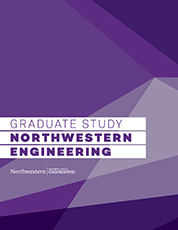Exploring Ethics and Leadership
EDI's ‘Ethics and Identity in Design’ course helps students develop the tools and a questioning mindset to navigate morally challenging situations.
Northwestern's Master of Science in Engineering Design Innovation (EDI) program is helping students explore professional ethics and leadership.
This year, the program made "Ethics and Identity in Design" a required part of the curriculum. The 10-week course is taught by George Aye, co-founder of Greater Good Studio. The class equips students with the tools to navigate morally challenging situations and be at the forefront of ethical leadership.
 “What this class provides is weeks of training so that students can step out of the culture they’re working in and say, ‘Hey, I think something is up,’” Aye said. “It signals a commitment that EDI is taking something seriously that I think, as a whole industry, we only take seriously when it’s too late.”
“What this class provides is weeks of training so that students can step out of the culture they’re working in and say, ‘Hey, I think something is up,’” Aye said. “It signals a commitment that EDI is taking something seriously that I think, as a whole industry, we only take seriously when it’s too late.”
The course was originally an elective class. Feedback from students and faculty alike highlighted its critical importance in shaping the next generation of design professionals.
“I want them to have practiced in our class how to pose a question without sounding belligerent, without torching their career,” Aye said. “The idea is to help students develop a preemptive questioning mindset.”
Each week, students tackle one of 10 ethical questions, such as how designers decide which people in need to serve. These discussions challenge students to consider why certain groups are deemed more “in need” than others, and how those perceptions impact design decisions.
The class also integrates students’ individual professional experiences. The idea is that if one student experienced an ethical dilemma before starting the EDI program, not only can they potentially talk about it, but they can help their classmates better prepare for a similar situation.
For Aye, one of the most important outcomes of the course is helping students recognize and name ethical issues others may overlook. Inspired by his colleagues at Greater Good Studio, he described this as a classification skill that can empower designers to challenge the status quo.
“Until an issue gets named, people keep bumping into it, walking around it, tripping over it, but never addressing it,” Aye said. “It ends up being taboo.”
Aye said students have responded to the course with enthusiasm and have told him it helped them see issues they never considered before.
That success comes in part from Aye’s deep history with equitable design. He co-founded Greater Good Studio in 2011 on the principle of using human-centered design to create a more equitable society. The company consults with non-profits, foundations, and government clients to promote positive social change.
One past company project tried to address the complexities of childcare issues in rural communities that inhibit people from lifting themselves out of poverty. The studio created a childcare incubator program to prepare people to run a care offering from their home. It coupled that with a grocery pickup and delivery service, freeing up people’s time to participate in education and career development.
Aye said he is proud to bring this type of focus to the EDI program.
“It’s really a different kind of leadership we’re cultivating here,” Aye said. "It’s not about having the right answer all the time. It’s the kind of leadership where we're saying what is on everyone's mind but that no one wants to talk about. It’s very validating that EDI cares enough about this to want to make it required.”

